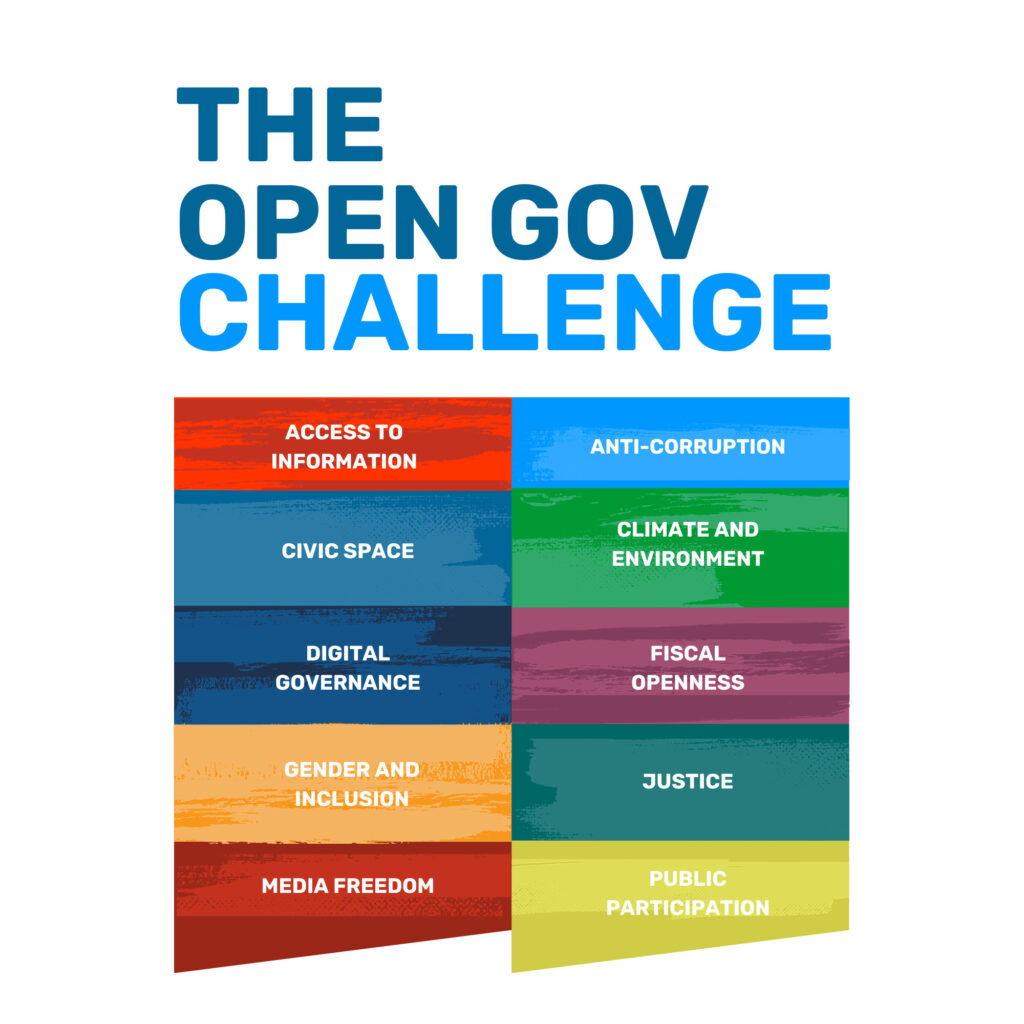
All around the world, we’re facing a host of crises. We’re emerging from a global health pandemic. We’re confronting immense economic challenges, inequity, geopolitical shifts, and a growing climate crisis. And we cannot ignore the layers of complexity new technology adds to all of this.
But it’s through these hard times that we see the power and potential of democracy and open governance. We know that when government and civil society work together, we see more ambitious and impactful reforms transform our communities.
We need the open government community to rise up. It’s our time to meet the moment. That’s why we’re launching the Open Gov Challenge.
The Challenge

The OGP Steering Committee and Support Unit are calling on the OGP community to channel their ideas and energy into lasting policy change to tackle current and future challenges.
Through OGP’s 2023-2028 strategy, the open government community identified open gov areas that can strengthen our democracies and improve our communities including:
- Access to Information
- Anti-Corruption
- Civic Space
- Climate and Environment
- Digital Governance
- Fiscal Openness
- Gender and Inclusion
- Justice
- Media Freedom
- Public Participation
Over the next five years, all members of the Partnership should aim to raise the ambition of reforms in these areas. Importantly, we hope all local and national members will participate and demonstrate relevant progress in as many of the areas of the Challenge through their OGP action plans or beyond.
The most ambitious reformers may be recognized regularly in international fora, featured in inspirational stories, and can share their progress across the OGP community.
Resources
Not sure where to start? We’ve built the Open Gov Guide as your go-to spot for the resources you need to rise and meet the Challenge. Discover model reforms, examples from across the Partnership, stories, and guidance on all the Challenge topics.
Use the updated OGP commitment template to nominate reforms to the Open Gov Challenge here.
You can also use this PowerPoint presentation (available in English, Spanish, and French) to spread the word about the Challenge and get your government to join hundreds of reformers who are taking action to meet the moment.
Join Us!
Join hundreds of reformers around the world – in government and civil society – who are working to make their communities stronger, more open, participatory, inclusive, and accountable. Let us meet the moment and take on the Open Gov Challenge! Fill out the standalone commitment form in your language to take the Challenge!
Challenge 1: Access to Information
Improve effectiveness of access to information legal frameworks.
Actions and reforms could include:
- Improving access to information oversight authorities independence, capacity, and integrity.
- Improving agency by agency access to information performance reporting and data (including requests, affirmative responses, response times, use of exemptions, appeals, and outcomes of appeals).
Challenge 2: Anti-Corruption
Develop or strengthen a whole-of-government anti-corruption strategy or roadmap.
Where strategies or roadmaps exist, improve policy, implementation and interoperability (including through OGP) across the areas below:
- Beneficial ownership
- Open contracting
- Political finance and asset and interest disclosure
- Lobbying
- Extractive industry transparency
Challenge 3: Civic Space Strengthen enabling environment and spaces for civil society and civic action
Actions and reforms could include:
- Designing and implementing non-profit law in a way that is impartial and minimally restrictive on the operations of independent organizations.
- Taking steps to train and support local authorities in respecting and protecting the right to freely assemble in an unbiased and minimally restrictive manner.
- Establish or strengthen existing spaces for govt-civil society collaboration (such as the OGP MSF) to initiate dialogue on civic space challenges, to inform design of reforms
Challenge 4: Climate and Environment
Use open government to strengthen implementation of strategies or agreements on climate and environment.
Actions and reforms could include:
- Implementing provisions in agreements such as the Escazú Agreement, Aarhus Convention or Paris Agreement
- Implementing climate and environment roadmap or strategy, strengthened through open government approaches.
- Ensuring public oversight and transparency for climate finance and greening existing fiscal and planning processes.
Challenge 5: Digital Governance
Strengthen transparency and public oversight of AI and data protection frameworks.
For new or existing AI, data processing and automated decision making policies, especially those governing the public sector, actions and reforms could include:
- Making underlying data publicly available (e.g. through transparency registers for algorithms).
- Embedding human rights impact assessments.
- Creating public grievance mechanisms.
- Creating or strengthening independent oversight agencies.
- Creating specific public consultation opportunities.
- Creating specific mechanisms to promote digital inclusion or to prevent online discrimination.
Challenge 6: Fiscal Openness
Advance public oversight and inclusion reforms across the budget and spending cycle.
Actions and reforms covering budgeting, revenue, spending and auditing could include:
- Promoting participatory mechanisms, targeting underrepresented groups, to inform spending priorities
- Combining online and offline tools to promote participation across the budget and spending cycle
Challenge 7: Gender and Inclusion
Adopt open government reforms to promote the full participation of women politically, socially and economically.
Actions and reforms could include:
- Gender-targeted reforms such as mechanisms to tackle gender-based violence, both online and offline;
- mainstream gender across other challenge areas (eg anti-corruption, fiscal openness, climate and environment)
- making the design and delivery of reforms participatory and inclusive of impacted communities.
Challenge 8: Justice
Advance people-centered justice reforms.
Actions may include:
- Ensuring that everyone has access to legal services.
- Ensuring that justice institutions across the public sector are independent, transparent, responsive to the public, and inclusive.
- Ensuring that there is accountability for policymaking through appropriate redress mechanisms that involve the public.
Challenge 9: Media Freedom
Develop or reinforce legal frameworks that protect the rights of journalists and independent media.
Actions and reforms could include:
- Remove criminal defamation, libel, and other penalties for reporting and tackling the use of SLAPPs (Strategic Lawsuits Against Public Participation) to silence journalists.
- Create supportive environments for revenue generation and mechanisms that allow for independent and public-funded media platforms and avoid the concentration of media ownership.
Challenge 10: Public Participation
Mainstream or embed fit-for-purpose, high quality and inclusive public participation practices across key government sectors, processes, and institutions.
Actions and reforms to ensure that people are involved in policymaking could include:
- Passing and implementing laws and policies that create the expectation of a higher level of public participation within the policy-making process, or establishing new mechanisms for participation.
- Creating participation teams or centres of best practice that are responsible for improving public participation.
- Institutionalizing platforms or mechanisms to promote participation within specific sectoral reforms.

